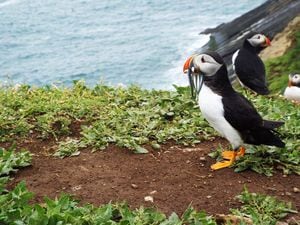Holidaymakers urged to leave coastal wildlife alone as they flock to Wales for Easter
Visitors heading for the Welsh coast over Easter are being urged to behave responsibly near marine animals such as seals, dolphins and nesting birds.

The police, the RSPCA and wildlife groups have launched a campaign with patrols in areas such as Llandudno, Abersoch and Pembrokeshire to ensure people enjoy watching wildlife from afar and stick to the "Observe, Don't Disturb" message.
They say disturbances to wildlife include people using speedboats, kayaks and paddleboards deliberately getting too close to seals, dolphins and cetaceans. This often causes stress to the animals and can result in the females suffering spontaneous abortions or babies being abandoned by their mothers.
Other issues include dogs off leads disturbing nesting birds or seals, litter severely injuring seals, wild camping beach barbecues and camp fires damaging beaches and quad bikes or 4x4s vehicles riding over nesting areas.
There have even been incidents where beachgoers have got too close to wild animals for the sake of a selfie.
RSPCA inspector Andy Broadbent said: “Every year, the RSPCA’s wildlife centres have to treat and rehabilitate a wide range of wildlife - including seals and seabirds - which have been injured or orphaned due to human disturbance.
“People may remember Wally the Walrus who visited Pembrokeshire last year. We had many reports of some people trying to get close to him by using jet skis or paddle and surf boards."

Sergeant Liam Jones of the North Wales Police Rural Crime Team said: “Op Seabird Cymru seeks to engage key partners to work with the police throughout Wales to educate those people who use our coastal areas and seas and to enable them to enjoy our wildlife safely and without disturbance.
“Over the years we have seen an increase in people using our coastal areas and being unaware of the effect that they can have on coastal birds and mammals if they act irresponsibly. A disturbance can have a devastating effect on certain species and their habitats and with simple education and engagement we can help prevent it from happening.
"Dog attacks can kill seals, as well as posing a risk to the dogs themselves from bites that can become infected from the bacteria that live inside a seal’s mouth. Seal pups disturbed by curious people will move off into the sea, using valuable energy which they need to survive and grow. Birds such as little terns travel thousands of miles to breed in very specific UK coastal points.
"They have one annual chance to nest and produce young, but if disturbed this opportunity is lost, and due to their ground nesting habit they are particularly vulnerable to dogs, and careless feet."

Inspector Broadbent said: "While our beautiful beach and coastal areas are great to have fun in, they are natural habitats and breeding grounds for many native and migratory animals, including several species on the endangered list. We humans share this space, and we can easily and unwittingly cause disturbance, fear, and distress.
“For many tourists it can be surprising and exciting to see marine mammals, including seals and their pups which will normally rest on the beach at various times of year, as well as ground nesting birds which are usually resident between March to September. But as tempting as it is to approach them, we would respectfully ask that everyone stays at a distance and keeps their dogs on leads and under control.
For concerns about the welfare of an animal, please contact the RSPCA’s helpline on 0300 1234 999.





